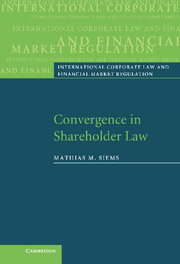PART II - The status quo of convergence
Published online by Cambridge University Press: 15 December 2009
Summary
Classically, in many areas of law, a division is made into common law, civil law, and mixed legal systems. Although this distinction is today no longer undisputed, for company law as well as for corporate governance systems this or a similar subdivision is often taken as a starting-point. On one side, then, is the Anglo-Saxon common law model. This is seen as pursuing a market-based approach, where the shareholder's individual interests are to the fore. Moreover, in these countries, capital markets are seen as more developed, so that the interest in shares is broader and shareholder ownership is often dispersed. In other countries by contrast, especially Germany and France but also Japan and China, it is claimed, concentrated ownership structures mostly prevail in joint stock companies. Since management cooperates with the dominant shareholders, what counts is more relations within the company than control through the markets. This ‘insider model’ is to be explained by the fact that banks and employees hold a strong position. The firm is accordingly run not primarily in the interests of shareholders, but of all stakeholders in the undertaking. In these countries, too, state influence plays a big part, so that political views are brought inside the companies.
Insofar as this distinction refers to the economic and social environment it can, despite advancing convergence, still be justified today. For shareholder law, however, a subdivision into different legal families is by now largely outdated. In Western countries, there has been not inconsiderable convergence.
- Type
- Chapter
- Information
- Convergence in Shareholder Law , pp. 29 - 30Publisher: Cambridge University PressPrint publication year: 2007



